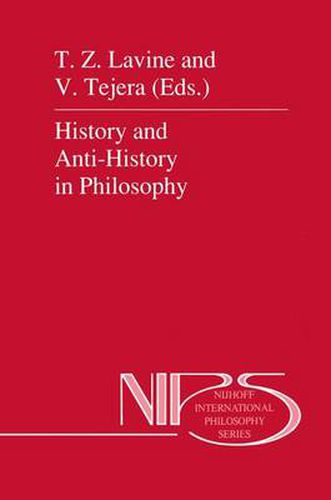Readings Newsletter
Become a Readings Member to make your shopping experience even easier.
Sign in or sign up for free!
You’re not far away from qualifying for FREE standard shipping within Australia
You’ve qualified for FREE standard shipping within Australia
The cart is loading…






This title is printed to order. This book may have been self-published. If so, we cannot guarantee the quality of the content. In the main most books will have gone through the editing process however some may not. We therefore suggest that you be aware of this before ordering this book. If in doubt check either the author or publisher’s details as we are unable to accept any returns unless they are faulty. Please contact us if you have any questions.
History and Anti-History in Philosophy demonstrates the viability of the idea of the unity of philosophic thinking and the reflective practice of the history of philosophy. It is a concise in-depth history of the deconstructive turn in philosophy, and of the styles of historical and interpretive contextualization afforded by diverse schools of thought. Thematic unity arises from the focus of contributors on the historical dimension of reflection in philosophy.
History of philosophy and intellectual history come together when they are forced to practice foundational analysis, namely, when they feel the need to uncover indubitables of society. Indubitables are deeply held, usually unnoticed premises upon which a society or group acts, builds, and speaks. By foundational analysis, the editors do not mean the search for acceptable starting points of intellectual exploration, but the ongoing criticism of all such postulates of faith.
For those interested in contextual analysis of Kant, Hegel, Marx, Dewey, Mannheim, Husserl, Dilthey, Heidegger, and Gadamer, this is an invaluable guide. The editors make plain their belief that not using history, as have past philosophies, is unphilosophic ideas in personal construction to a text that cannot supply reasons for being taken seriously in history. This volume illuminates the achievements of present-day social science insights. It merits a close reading by those for whom the history of ideas is a living entity.
$9.00 standard shipping within Australia
FREE standard shipping within Australia for orders over $100.00
Express & International shipping calculated at checkout
This title is printed to order. This book may have been self-published. If so, we cannot guarantee the quality of the content. In the main most books will have gone through the editing process however some may not. We therefore suggest that you be aware of this before ordering this book. If in doubt check either the author or publisher’s details as we are unable to accept any returns unless they are faulty. Please contact us if you have any questions.
History and Anti-History in Philosophy demonstrates the viability of the idea of the unity of philosophic thinking and the reflective practice of the history of philosophy. It is a concise in-depth history of the deconstructive turn in philosophy, and of the styles of historical and interpretive contextualization afforded by diverse schools of thought. Thematic unity arises from the focus of contributors on the historical dimension of reflection in philosophy.
History of philosophy and intellectual history come together when they are forced to practice foundational analysis, namely, when they feel the need to uncover indubitables of society. Indubitables are deeply held, usually unnoticed premises upon which a society or group acts, builds, and speaks. By foundational analysis, the editors do not mean the search for acceptable starting points of intellectual exploration, but the ongoing criticism of all such postulates of faith.
For those interested in contextual analysis of Kant, Hegel, Marx, Dewey, Mannheim, Husserl, Dilthey, Heidegger, and Gadamer, this is an invaluable guide. The editors make plain their belief that not using history, as have past philosophies, is unphilosophic ideas in personal construction to a text that cannot supply reasons for being taken seriously in history. This volume illuminates the achievements of present-day social science insights. It merits a close reading by those for whom the history of ideas is a living entity.